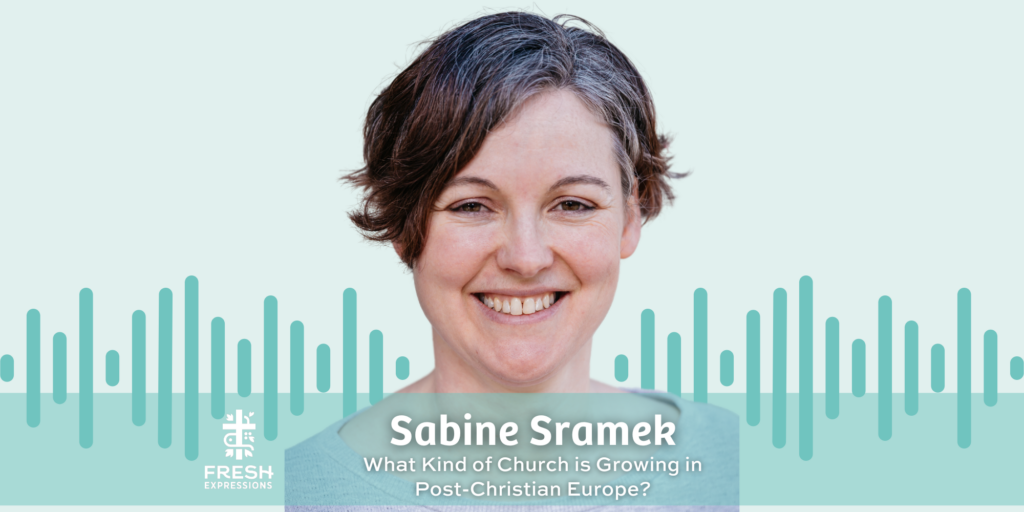Listen
Watch
Show Notes
The church in Europe has been declining for decades. But at the same time, a hopeful new movement that inspires everyday Christians to start their own faith communities. In this episode, you’ll discover what kind of church flourishes in today’s world.
Sabine Sramek is a sociologist by training and has served on the German Fresh Expressions Team since 2014 where she directs the internship program and outreach to young adults. She and her husband Ingo are the proud parents of Johanna. They live in Tübingen, near Stuttgart (South Germany). She enjoys reading, horse riding, and traveling. Her favorite books include Terry Pratchett’s Discworld Novels and almost anything by N.T. Wright.
Interview Summary
“It’s not that the gospel has changed, but the way we meet with people sociologically has changed.”
This poignant statement from Sabine Sramek , a sociologist and member of the Fresh Expressions team in Germany, sets the stage for a deep dive into the evolving dynamics of church in a post-Christian Europe.
Sabine, living in southern Germany and actively involved in her local Protestant church, brings a wealth of experience in sociology to the Fresh Expressions movement. Her insights provide a unique lens through which to view the challenges and opportunities facing the church in today’s rapidly changing societal context.
The Decline of Institutional Religion
In the heart of the interview, Sabine discusses the decline of Institutional Religion, observing a stark generational shift in church engagement.
She reflects, “We have really a generational cut… the new generation… doesn’t see church life or religious life as a major part of their lives anymore.”
This sentiment underscores the urgency for the church to adapt and find resonance with the younger generation, who increasingly perceive traditional religious practices as obsolete.
Cultural and Sociological Shifts
The conversation then navigates through the cultural and sociological shifts affecting the church.
Europe is big… there are a lot of different cultures… we need to understand these nuances to effectively address the challenges.
Her expertise as a sociologist allows her to dissect the complex interplay between culture and religion, illustrating how these elements shape the church’s approach to ministry and community engagement.
Signs of Hope and Innovation
Amid these challenges, Sabine identifies signs of hope and innovation within the church’s evolving landscape. She acknowledges, “The church is trying to react… there are also hopeful signs… churches are becoming more united and innovative.” This optimism is reflected in the emergence of novel church formats like forest churches and horse riding churches, which signify a departure from traditional settings and an embrace of new, engaging ways to experience faith.
Fresh Expressions of Church
The narrative deepens with a focus on Fresh Expressions of Church, where Sabine shares enthusiastic observations about the innovative paths churches are taking. She highlights, “There are a lot of… forest church or outside church movements connecting now… it’s really extraordinary.”
These initiatives represent a broader trend towards adapting church practices to better align with contemporary societal norms and preferences.
The Impact of Sociological Training
Sabine’s impact of sociological training is evident as she navigates these topics, offering a lens through which to view the church’s adaptation to societal changes. Her sociological background enriches the discussion, providing a nuanced understanding of the forces at play in the religious landscape. She asserts, “Sociology is really what’s changed… it helps us to understand the changing dynamics and adapt our methods.”
The interview with Sabine culminates in a reflection on the church’s journey through a landscape marked by both decline and rejuvenation. Her insights offer a beacon for those navigating the complexities of faith in a rapidly transforming world. By marrying sociological acumen with theological depth, Sabine presents a compelling vision for a church that remains vibrant and relevant in the face of change.
Reflection Questions:
- How can we better understand the generational shift in church engagement?
- In what ways can churches across denominations collaborate more effectively?
- What role does sociology play in shaping our approach to church and community?
- How can innovative church forms like forest churches or treehouse camps be implemented in your context?
- How does the concept of discipleship evolve in the context of modern church movements?
- What does the future of church look like in a rapidly changing sociocultural landscape?

